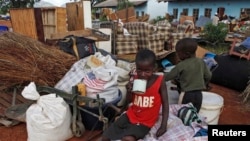A Human Rights Watch investigation alleges 20,000 Zimbabwean flood victims, displaced in February 2014, were commandeered as cheap labor to serve President Robert Mugabe’s energy business interests. Zimbabwe's government has broken several African Union conventions on the rights and protection of internally displaced peoples, according to the report.
Torrential rains a year ago caused flooding in several villages near the partially constructed Tokwe-Mukosi dam - in Masvingo province in southeast Zimbabwe.
The flooded villages were to have been resettled by October 2013 as part of a phased relocation of 32,000 people and their livestock to make way for the dam. Many were refusing to leave until they received compensation.
A Human Rights Watch report, issued Tuesday in Harare, says following the floods, 20,000 people were evicted and resettled through an abuse filled process. It said displaced families have faced violence and harassment.
HRW researcher Dewa Mavhinga said better management could have avoided the emergency displacement, but flooding conveniently gave the government an opportunity to relocate resistant villagers.
“The decision to dam the water, to close the tunnels so water stays in the dam is not taken until people are removed from the dam basin and resettled. So in this particular case ... we are asking that there be an investigation into that ... From that point of view, yes, this could be engineered flooding because it was preventable,” said Mavhinga.
More than 3,000 relocated families lived in squalid transit camps before the government forcibly moved them to one-hectare plots on Nuanetsi Ranch - earmarked by President Robert Mugabe as a sugarcane plantation for a government-owned ethanol project. The families were told they would grow only sugar cane for the ethanol project or lose government relocation aid.
HRW says people should not be coerced into becoming sugarcane farmers, but be compensated fairly and allowed to choose where to reside.
Zimbabwe officials reject the criticism. Masvingo Province Affairs Minister Kudakwashe Bhasikiti said land has been set aside to permanently resettle the families to ensure they had a decent living.
“We have, so far, pegged more than 700 stands were we want to decongest the camp and put them in one hectare settlement stands, these are primary for building accommodation were they are staying and then three hectares which will be under irrigated agriculture. So our position at the moment is we are moving with speed,” said Bhasikiti.
The AU Convention for the Protection and Assistance of Internally Displaced Persons in Africa, which Zimbabwe ratified in 2013, stresses human rights must be respected at every stage of displacement and resettlement. Mavhinga said that was not happening in Zimababwe.
“Zimbabwe is violating all the principles and obligations that are spelled out in that convention ... it is really tragic and sad from a human rights point of view because this is the same person, who at home is unable and unwilling to commit to the values that are in the Kampala Convention on the rights of the internally displaced,” said Mavhinga.
The HRW report comes just days after Zimbabwe President Robert Mugabe assumed chairmanship of the African Union (AU). Many have questioned the decision given his spotty human rights record during the past three decades as Zimbabwe’s leader.
With Mugabe leading the pan-African body, civil rights groups say there appears to be little chance the organization will pressure his government into adhering to the convention.
(Sebastian Mhofu contributed to this report from Harare.)




